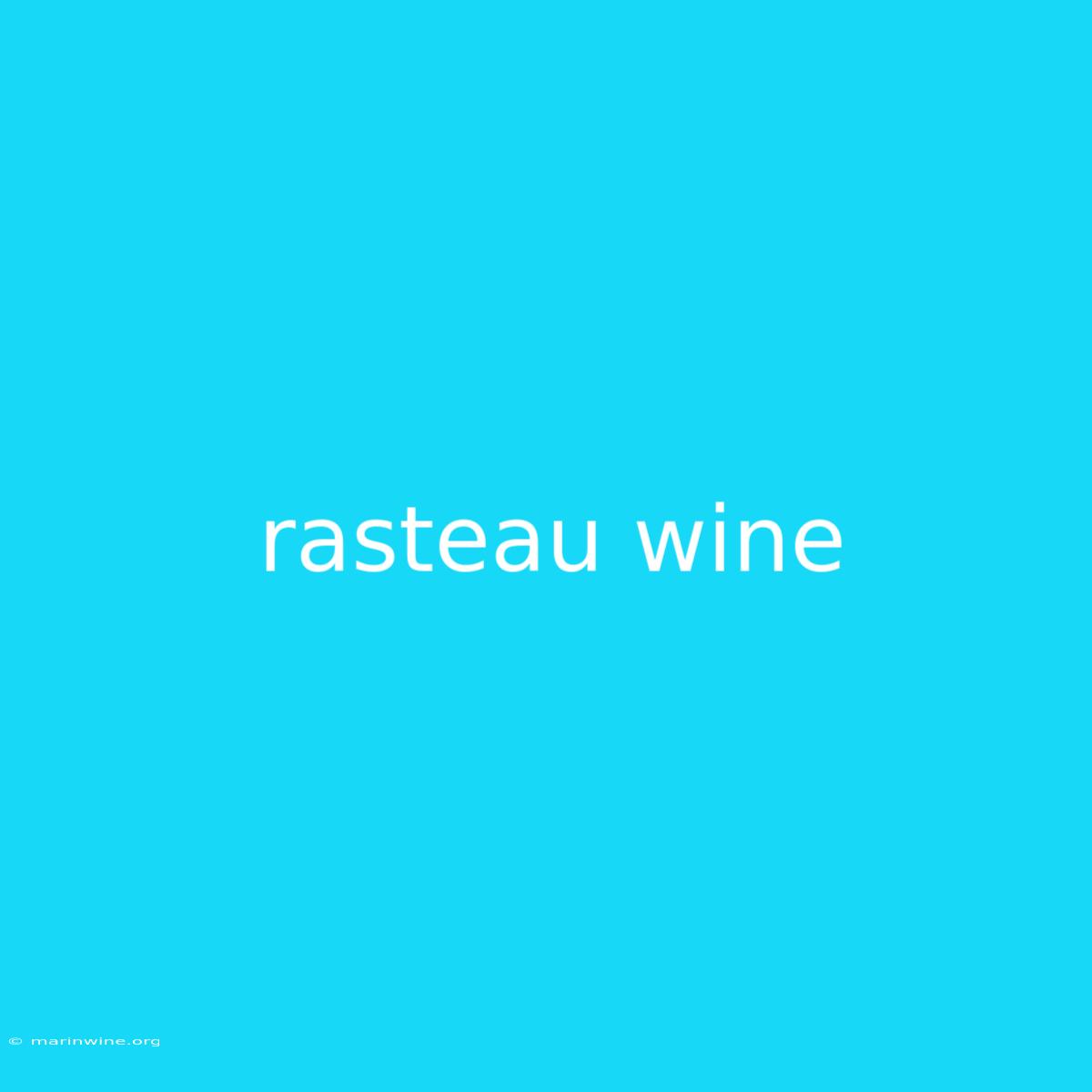Unveiling the Secrets of Rasteau Wine: A Journey Through Rhône's Hidden Gem
Editor's Note: Rasteau wine, a hidden gem from the Rhône Valley, deserves more attention. While often overshadowed by its more famous neighbors, this appellation offers unique and complex wines at exceptional value.
Why It Matters: Rasteau wine, produced in the Southern Rhône, is an exciting prospect for any wine enthusiast. It boasts a rich history, a diverse range of grape varieties, and a distinctive style that reflects the region's unique terroir. This article will delve into the captivating world of Rasteau wines, exploring its characteristics, key players, and reasons why it deserves a place on your wine list.
Key Takeaways of Rasteau Wine:
| Feature | Description |
|---|---|
| Appellation | Southern Rhône, France |
| Red Blend | Grenache, Syrah, Mourvèdre, Cinsault, and other authorized varieties |
| Style | Full-bodied, robust, earthy, with aromas of red and black fruit, spice, and garrigue |
| Aging Potential | Many Rasteau wines can age gracefully for 10-15 years or more, developing complexity |
| Price | Generally offers excellent value for its quality |
Rasteau Wine: A Hidden Gem in the Rhône Valley
Rasteau, nestled in the Southern Rhône, is a relatively small appellation yet known for its rich history and unique wines. The appellation, with its terroir characterized by a blend of clay, limestone, and sand, is ideal for producing complex and robust wines with an unmistakable character.
Key Aspects of Rasteau Wine
1. Grape Varieties:
- Grenache: This dominant grape variety, known for its fruit-forward character, provides the backbone of Rasteau wines, contributing to their fullness and richness.
- Syrah: The grape responsible for adding structure and complexity, offering notes of black pepper, licorice, and earthy tones.
- Mourvèdre: This bold grape contributes depth, structure, and dark fruit notes, adding complexity and longevity to the blend.
- Cinsault: A lighter grape, Cinsault adds elegance and floral aromas, balancing the intensity of the other varieties.
2. Vinification:
Rasteau wines are renowned for their traditional methods of winemaking. They are generally aged in concrete vats or large oak barrels, contributing to their powerful structure and earthy notes. Some producers also employ a "saignée" method, where a portion of the juice is drained off, resulting in a more concentrated and concentrated wine.
3. The Terroir of Rasteau:
The unique terroir of Rasteau plays a crucial role in shaping the character of its wines. The combination of clay, limestone, and sand soil, along with the influence of the Mistral wind, contributes to the distinctive earthy and herbal notes found in Rasteau wines.
4. Vin de Pays de la Dentelle:
Rasteau is known for its production of Vin de Pays de la Dentelle, a white wine made from Grenache Blanc and Clairette. These wines are often light-bodied and refreshing, showcasing the unique flavors of the appellation.
Rasteau Wine: A Tale of Tradition and Modernity
The wines of Rasteau represent a blend of tradition and innovation. While adhering to the region's historic winemaking techniques, many producers are embracing new methods to enhance the quality and expression of their wines. The use of biodynamic practices and minimal intervention techniques is becoming increasingly common, further emphasizing the commitment to quality and respect for the environment.
Discovering the World of Rasteau Wines
Exploring the world of Rasteau wines is an enriching journey, revealing the unique character and diversity of this hidden gem. From the robust reds to the elegant whites, these wines offer an exceptional value, providing a gateway to the Southern Rhône's vibrant wine landscape.
FAQ for Rasteau Wine
1. What is the difference between Rasteau and Côtes du Rhône?
While both regions are located in the Southern Rhône, Rasteau wines are generally bolder and more concentrated due to the region's unique terroir and the use of specific grape varieties.
2. What are some of the best Rasteau wines?
Some highly acclaimed Rasteau producers include Domaine de la Mordorée, Domaine de la Soumade, and Domaine de la Janasse. These producers offer a diverse range of wines, showcasing the appellation's potential for quality.
3. What foods pair well with Rasteau wines?
Rasteau wines are highly versatile, pairing well with hearty dishes such as roasted meats, lamb, game, and cheeses. Their robust character also complements grilled vegetables and hearty stews.
4. How do I find Rasteau wines?
While not as widely available as some other Rhône wines, Rasteau wines can be found at specialty wine shops and online retailers. It is worth seeking out these hidden gems to discover the unique character of the appellation.
Tips for Enjoying Rasteau Wine:
- Decanting: Rasteau wines can benefit from decanting, allowing them to breathe and soften their tannins.
- Serving Temperature: Serve Rasteau reds at a temperature between 60°F and 65°F for optimal enjoyment.
- Pairing: Experiment with pairing Rasteau wines with different dishes to discover its versatility and delicious potential.
Summary of Rasteau Wine:
Rasteau wine, a hidden gem of the Southern Rhône, offers a unique and compelling wine experience. From its rich history and diverse grape varieties to its distinctive character and exceptional value, Rasteau deserves a place on your wine list. By exploring the wines of this appellation, you will discover a world of flavor and complexity, revealing the true potential of this often overlooked region.
Closing Message: Embrace the opportunity to explore the hidden treasures of Rasteau wine. Discover the complex and robust flavors that make this appellation a unique and exciting part of the Rhône Valley wine landscape. Allow yourself to be captivated by the stories behind these wines, the dedication of the producers, and the rich heritage of the region.

